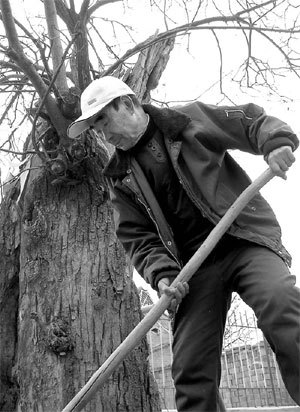Spring has sprung, a new nature cycle turns and one old man and his beloved old tree grow another year older. Liu Zejun rises at 5 every morning and immediately sets out to check upon his old friend: a pagoda tree standing by his yard at Xiawuge village.
The 79-year-old from Wen'an county, North China's Hebei Province, treats the tree like a family member because it has played such an important part in his life.
Through times of war and peace, the tree has seen it all. Not just Liu Zejun's lifetime, it has seen more than 30 generations of the village's history unfold.
According to legend, General Yang Liulang (AD 958-1014) in the Song Dynasty (AD 960-1279) once tied his horse to the old tree during a famous battle.
In the 1940s, Liu joined the militia and carried ammunition and wounded soldiers for battles against the Japanese army. Supported by the thick branches and covered by the dense leaves, he spent many unforgettable days scouting the movements of the invading Japanese army.
|

|
|
Liu Zejun turns up the soil for the old pagoda tree at Xiawuge village. |
The pagoda tree, or Chinese scholar tree, has long been considered a symbol of good fortune and joy. The tree was often planted near Buddhist shrines and served as a memorial for government officials.
There were two other similar aged pagoda trees in the village and were planted near a Buddhist temple during the Tang Dynasty (AD 618-907).
One of them died during the War of Resistance Against Japanese Aggression (1937-45) when the Japanese blew up a nearby dam, and another old tree was burned to the ground in 1960.
The last tree has survived, thanks to Liu's persistent care.
Liu has been keeping a diary since 1947, and he can tell the exact dates when the tree was almost destroyed.
On July 21, 1994, a heavy storm struck the village at midnight. Liu says he kept hearing maddening thunder and the next morning, he found the old tree had been torn apart. Leaves and branches scattered around the remaining part of its trunk. His old friend was dying.
"I was heartbroken to see it," Liu says.
The old tree used to be more than 10-m tall and it took six men with their arms stretched to encircle its trunk.
In summer, the lush leaves provided a cool shade for villagers. The tree proved to be more than a favorite play site for children.
"The trunk was hollow inside, kids often climbed inside the tree and played hide and seek," Liu recalls.
Liu became the village head in the 1960s and after retiring went to work as a gardener in nearby Langfang city. He developed a green thumb and developed a keener interest in flora.
His biggest battle to save the tree began in 1996, when a major flood cut his township off from the outside world and stranded the villagers. Lacking firewood for cooking, some villagers logged trees, including the old pagoda tree.
"It is still alive, you can't do this," Liu shouted to a fellow villager who had begun to chop it apart. He stopped the man, but half of the tree had already been destroyed.
"It's merely a tree, mind your own business," the villager shouted back.
They fought and were pulled apart by others. Since then, nobody has dared to cut branches from the tree.
"Many villagers said I was mad and laughed at me, but I didn't care," Liu says. "The tree needs protection, I feel it deep in my heart."
He put the broken branches at the foot of the tree in memory of a special friend.
From then on, Liu took up the mission of guarding the old tree. He forbids children to damage the tree and warns off villagers who try to pick its flowers for medicine.
Every season, he buys fertilizer and pesticides to add life to his very old friend.
In 1998, Liu built a flat by the tree. His second son has promised to look after the tree after the old man passes away.
"Why do people desire for money beyond their basic needs? Enough food and a rich spiritual life are good enough for me," says Liu, who grows vegetables, fruits and flowers in his yard.
In the 1990s, Wen'an county's forest coverage dropped to 5.9 percent due to heavy logging.
Planting trees gained priority in the county in the past decade and the forest coverage has reached 28 percent this year.
In 2006, the Suqiao township government built iron fences for the old tree.
A stone stele with carved inscriptions was set up to display its eventful history. Liu was happy to take on the role as the tree's protector.
As the sun sets and a breeze of spring tenderly touches the buds of the old tree, Liu sits down in his yard and reads a poem he wrote:
"Spring, summer, fall and winter; they come and leave. An ancient temple and three old trees, how many sunsets have they seen? The old tree which General Yang attached his loyal horse on, is still singing the songs about the legends 1,000 years later."
In 2002, Liu's wife died from cancer. She also took care of the tree with him.
"Every time I see the tree, I can feel my wife," Liu says.
"Death is a part of life. What's important is whether you have achieved something meaningful when you are alive.
"For me, protecting the old tree is a duty of life."
(China Daily April 21, 2009)